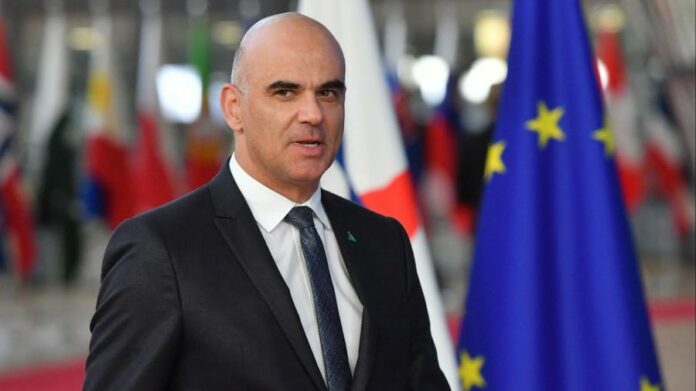Switzerland has announced plans to restart diplomatic negotiations with the EU after a two year hiatus that raised doubts over the country’s future economic and political relationship with the bloc.
Bern said that it was authorising diplomats to prepare a formal negotiating mandate to reopen talks this summer on a deal that could stabilise trading ties in exchange for concessions on Swiss sovereignty.
“There is a positive momentum in the talks between Switzerland and the EU at the technical, diplomatic and political levels,” the government said on Wednesday.
Swiss officials are proposing a “package” agreement bundling multiple treaties rather than a universal framework. Efforts to forge a comprehensive “framework agreement” that reworked a series of treaties with Brussels into a single text foundered in May 2021 when Bern abruptly announced it was abandoning the process.
The breakthrough came earlier this month after a visit to the Swiss capital by European Commission vice-president Maroš Šefčovič, responsible for relations with Switzerland. He agreed to ditch the overarching format for talks.
“We welcome the positive momentum towards modernising EU-Swiss relations,” Balazs Ujvari, a commission spokesman, said on Wednesday. “Our objective remains the same: to upgrade EU-Swiss relations in a way that reflects Switzerland’s deep integration into the EU single market, with a level playing field as its cornerstone.”
The 2021 breach set the stage for a “slow motion Swexit”, as individual agreements in areas such as medical regulation, financial equivalence and engineering standards lapsed.
The framework negotiations, which had dragged on for seven years, were regarded by many in Bern as an attempt to strong-arm Switzerland into big concessions as the EU sought to consolidate its authority with neighbouring states. In a 2020 referendum, 38 per cent of Swiss voters supported pulling the country out of the passport-free Schengen zone.
In Brussels, the negotiations were meanwhile seen as a way of streamlining future EU-Swiss relations and rectifying disproportionate concessions granted to the country as a result of previous piecemeal negotiations.
A country of slightly less than 9mn people, Switzerland is the fourth-largest economic partner of the EU, after China, the US and UK, with annual bilateral trade worth €280bn last year.
Bern has shrugged off any fallout from the failure of the framework talks. A treaty on the mutual recognition of standards on medical devices has lapsed, as well as EU recognition of instruments traded on Swiss financial exchanges, but most of the 120 individual accords with Brussels are still in place.
But Switzerland’s economic resilience may not last. The country is in urgent need of an electricity and power-trading agreement with Europe, economists point out, as highlighted by extreme energy price fluctuations this year, and Swiss universities are clamouring for access to the EU’s Horizon funding programme.
Ujvari said a new accord “will help unlock the full potential of our co-operation, including in other areas, such as electricity, health and food safety”.
The Federal Council, Switzerland’s executive body, said in a statement that it was hopeful of a mutually beneficial outcome to the “package approach” being taken in the revived round of negotiations.
The council said it had made significant progress in winning domestic support for the talks. Last Friday, the country’s 26 cantons agreed a common approach to European policy, greenlighting Bern’s move.
But Switzerland’s largest political party, the rightwing populist SVP, said the government was “taking the people for fools”. The proposed negotiation is “old wine in new bottles” it said on Wednesday, promising to “resolutely oppose” any concessions on Swiss constitutional sovereignty.
Bern said it had devised a number of “supplementary” technical policy and legislative measures it could deploy domestically to ameliorate the effects of looser rules demanded by Brussels on wage protection, state aid, immigration and economic subsidies.
Šefčovič warned that there were still big differences between the two sides, especially Switzerland’s adherence to single market rules.






